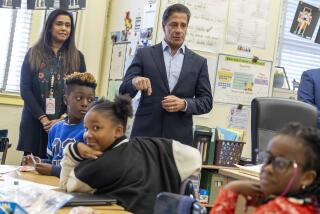TV Challenge Unglues Class
- Share via
Karen Helmuth, 9, on Wednesday proudly showed off her artwork collage titled “Neighborhood Treasures.”
Matt Johnson, 9, grinned and displayed a model sailboat.
Both had produced the items while they, like the other 26 fourth-graders at California Elementary School in Costa Mesa, went cold turkey and voluntarily switched off the television for two weeks.
Karen made it all the way through. Matt slipped.
Both learned things about themselves, their family and the world they live in, they said Wednesday.
“The project was more than TV,” said teacher Laura Holmes. “It was a good opportunity for us in the class to discuss making a promise and then keeping it.”
The promise, in this case, was to turn off the television--an addiction many didn’t realize they had.
“I found I can’t live a few days without TV,” said Gary Wilson.
The two-week project ended on Monday with mixed results: a few went all 14 days without watching one TV show. Some weakened after only a day and resumed watching their favorite programs. A few, figuratively white-knuckled, held on until the last few days and then could no longer resist.
“This is the third year I’ve done this with my class,” said teacher Holmes. “It’s not that I think TV is bad. It’s just that it takes away time, and I wanted the children to learn they would have more time to be with their families in other activities and more time to be outside and active and more time to read.
“The national statistics show that an average child will have spent more hours watching TV than all his school time by the time he finishes school,” she said.
Heather Nagami, 8, said that before the experiment, she was watching four or five hours of TV a day. But, she said, she was happily surprised to find she could live without the tube. She went the full 14 days without TV even though strong temptation lurked: “I could sometimes hear my sister, who’s 12, and my mother laughing as they were watching it.”
Read a Lot
In her paper, part of the project, Heather wrote: “When I wasn’t watching TV, I rode my bike, I listened to the radio, and I read a lot.”
Greg Dill, 9, said that he fell back into TV-watching after the first week. “A lot of new shows were coming on,” he said.
Several of the backsliders admitted that at first they weren’t honest with their teacher when she queried them each day. “I started watching but didn’t tell her until the very end,” one boy said. But he felt uncomfortable hiding the truth, he said. “I learned I shouldn’t lie.”
Brian MacLean, 9, said his family helped by also swearing off TV.
“Our whole family was together a lot more during that time. We played games like Monopoly. I figured out I don’t have to watch so much TV. I used to watch four or five hours, and now I just watch one or two hours (a day).”
Matt Johnson said that even though his dad worked with him in building a model sloop, he still pined for “action TV shows and cartoons. . . . I began watching again about the second day.” Nonetheless, Matt said, “I learned I could do things I didn’t think I could.”
Parents Respond
As part of the project, parents were asked to complete a questionnaire about their experiences during the two weeks.
One father responded: “I discovered several years ago that I was watching TV as something to do, rather than something I wanted to do. I think the two-week experience was great, and the whole family benefited from it.”
Another parent wrote: “Thank you, Ms. Holmes. . . . I’m happy my child has a teacher who teaches more than scholastics--by teaching children to evaluate how valuable their time is.”
More to Read
Sign up for Essential California
The most important California stories and recommendations in your inbox every morning.
You may occasionally receive promotional content from the Los Angeles Times.










